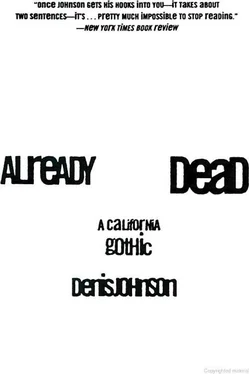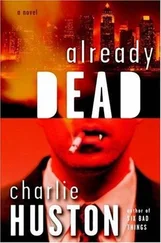“Hel- lo ”—personality forcefully projected, a sense of being met halfway, a sense that you matter. Sunny. Truly winning. But in retrospect, truly phony. Giving one impression in the flesh, completely different when called to mind.
He’d heard her mentioned around. She had a reputation for unsa-Already Dead / 65
vory weirdness. What was it, mistreating small animals, acquiring occult paraphernalia, books — I thought I saw her walking by the road late at night. But I was off duty — the badge was off — I didn’t even slow down.
She looked like a widow. Mourning. Somebody claimed to have spied her one night standing naked on a bluff over the sea. Absolute bullshit.
Not for free. You’d have to pay to see that type naked. Though it was dark and he was supposed to be steering the car, he glanced one more time at the note in a child’s hand—
The lesbo is a Witch
— before jamming it into the ashtray. The atmosphere in this neighborhood seemed unusually warm and strangely hushed. Something thumped on the hood, and then several more times on the roof — and before he’d travelled two more blocks he was driving through a downpour of such ferocity that he could hardly see ahead of him.
It stormed steadily as he eased the squad car down the main street and parked beneath the windows of his home: he’d rented a place over the video store, and at first it had seemed ideal — not far from the ocean, looking out on this quaint little stretch of Route 1 through Point Arena — but since then it had shown itself to be just the kind of spot he always ended up in, solitary and cold. Rather than get wet finding his way up to it, he sat for hours in the car looking out at the blurred drumming California street. Or maybe it just seemed like hours. He cracked the window an inch, rested his torch and stick on the dash and settled back and dozed.
He found himself under black skies, out on a battlefield looting the uniforms of slain clowns. The woman Yvonne was on the periphery of things. He could smell her, and it was erotic. He woke up still seeing her strange face.
Toward dawn the weather let up and he uncurled himself stiffly from the front seat and stood on the sidewalk in a town that seemed fresh and hopeful, its chastity in a way renewed. It made him hungry for breakfast. But nothing was open yet. Despoiled of any alternative, he climbed the stairs toward his home above the movies.
Van Ness woke up with a sore throat, sore tongue, sore mucous membranes up through his ears.
Somebody was having a fuzzy conversation. He seemed to be part of it.
66 / Denis Johnson
“Are you all right? What a stupid question. I’ve got your glasses, let me—”
So he could hear. And he could almost see. Otherwise his lack of information was complete.
“What’s your name?”
Even down to that. His tongue was swollen. He made a noise with his voice. That was a mistake. It went dark. I’ve shut my eyes, he thought.
Then he came to and everything seemed white — daytime, morning?
The guy gave him something in a cup. Van drank it. It was tea.
He wasn’t unconscious, but not paying attention. He felt the warmth of spilled tea with pleasure on his swollen hands.
He watched the man at the kitchen table in his green bathrobe, now punching buttons on a telephone. Zealously he accomplished this, ec-statically. “Do I have the main library? Reference?” he said. “Well, no then, the information desk. Information?” He was leaning into it. The man was on the phone. “I wish to know,” he said, “how far ahead of the hunters, usually, the hunting dogs will go. By what distance usually, usually , does the dog precede its master in the wild? On the average.
It’s a matter of life and death.”
He wore a baseball cap with an emblem on the crown, the bill of which he worried incessantly with his free hand, like a baseline coach.
“I’d like you to direct me, also, if possible, toward some literature that would discuss the smelling powers of these animals. These hunting dogs. Or dogs in general. The whole odor thing.” Van woke up again later. Daylight still, and still the man sat at the kitchen table, but he was silent. He appeared to be playing solitaire.
He looked over at Van. “How old are you?”
The man was willowy, pale, with thin hands, and eyes that were large and feminine and wounded. His ears jutted out because he wore his baseball cap pulled down tight on his head. He looked to be in his late thirties. Maybe younger, but eaten-at.
“Forty-two,” Van told him with an amazing croaking sound.
“Born in forty-eight? Forty-nine? A child of both halves of the century.
Do you remember a song — from the sixties, I think — whose refrain went like, Sometimes…the hunter…gets captured…by the game… ?” Van did not reply.
Already Dead / 67
Around sunset, Van Ness sat at the kitchen table with a blanket around his shoulders, spooning up clear broth out of a heavy bowl.
Through the window he saw the man he assumed to be his host, still in his bathrobe, his white feet, in zoris, showing beneath its hem, walking flat-footed in the pasture as if it were wet out there, and carrying a black bucket. He poured its contents at the feet of a fat ugly horse.
He took his cap off, fanning at flies while the horse bowed its head over the food. All around the pasture grandly proportioned assemblages of gray timber and junk farming equipment scattered their shadows. He took their intent to be artistic.
Van found the kitchen a pleasant place. The house’s design was solar-efficient; the late sun reached him now, and it was warm. This was a small home with a big loft upstairs and also perhaps a single room — he saw a door at the top of the landing. Down here just the living room and kitchen and a door to, he presumed, a study or a little den. He’d been sleeping in the living room, in a Hide-A-Bed contraption.
He’d done it. He’d killed himself. And here he was. He was probably dead in that universe, but in this one right next door he persisted; his consciousness had simply moved over into this other, potential world in which he did not die. Right. You go down through one hole and come up out of another. Death just moves you to another square. Now he could be sure all beings were immortal. He couldn’t kill, he couldn’t die. They’d been telling us that life was an illusion, but they lied. The illusion was death.
Van’s host stood inside the front door kicking his thongs off and then strode barefoot to the kitchen, nodding in the direction of the pasture and the horse. “Our equine amigo.”
Van sipped at his broth, which tasted like chicken. It seemed to make him hungrier. Maybe some cereal would go down.
“I’m Nelson Fairchild,” the man said. “And I’m going to pour myself some wine. Will you tell me your name?”
“Van Ness. First name Carl.”
“And you won’t be saying much more,” Fairchild predicted, referring to the terrible sound Van was making words with. “Now,” he said, “I’m going to offer you a glass so you can toast with me. Drink it or not, whatever you feel like.” Fairchild held the liter bottle tightly 68 / Denis Johnson
with both hands as he poured. He raised his glass high: “The first person ever to be born in space!”
He sat down at the table, and Van watched him drink. Fairchild was younger than he’d thought, more like twenty-five than thirty-five. A young dude with an old man’s fear in his eyes — fear was the driving wheel. There was a form of security in knowing a person’s prime mover.
The young man’s hands were steady now. He lifted and spread the deck of cards from his solitaire game, stripped one gently from the fan, slapped it down: “The Suicide King.”
Читать дальше












